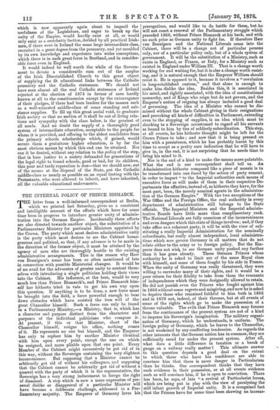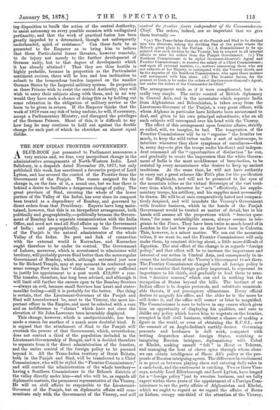THE INTERNAL POLICY OF PRINCE BISMARCK. T HE letter from a
well-informed correspondent at Berlin, which we printed last Saturday, gives us a consistent and intelligible account of the efforts which have for some time been in progress to introduce greater unity of adminis- tration into the German Empire. Incidentally these .efforts are also directed towards another object, the substitution of a Parliamentary Ministry for particular Ministers appointed by the Crown. The party which most desires administrative unity is the party which most desires to see the Cabinet homo- geneous and political, so that, if any advance is to be made in the direction of the former object, it must be attained by the agency of men who are thoroughly hostile to the existing administrative arrangements. This is the reason why Herr von Bennigsen's name has been so often mentioned of late in connection with possible Ministerial changes. It would be of no avail for the advocates of greater unity to content them- selves with introducing a single politician holding their views into the Cabinet. His influence, at the best, would be very much less than Prince Bismarck's, and Prince Bismarck him- self has hitherto tried in vain to get his own way upon this question. If anything is to be done, a new force must be brought into the field, a force powerful enough to bear down obstacles which have resisted the iron will of the great Chancellor himself. Such a force can only be found in a Parliamentary Ministry,—a Ministry, that is, which has a character and purpose distinct from the characters and purposes of the individual politicians who compose it. At present, if this or that Minister, short of the Chancellor himself, resigns his office, nothing comes of it. He represents no one but himself, and the Emperor has only to replace him by another Minister identical 'with him upon every point, except the one on which he resigned, and more pliable upon that one point. Every Member of the Cabinet might successively be got rid of in this way, without the Sovereign sustaining the very slightest inconvenience. But supposing that a Minister cannot be arbitrarily got rid of without his colleagues, and supposing that the Cabinet cannot be arbitrarily got rid of without a quarrel with the party of which it is the representative, the Sovereign has a very strong inducement to forego the right of dismissal. A step which is now a mere expression of per- sonal dislike or disapproval of a particular Minister will have become a deliberate challenge, addressed to a Par- liamentary majority. The Emperor of Germany loves his prerogatives, and would like to do battle for them, but he will not court a renewal of the Parliamentary struggle which preceded 1866, without Prince Bismarck at his back, and with no such prize as German unity to fight for. If therefore Harr von Bennigsen and the National Liberals come into the Cabinet, there will be a change not of particular persons only, nor of a particular policy only, but of a whole system of government. It will be the substitution of a Ministry, such as exists in England, or France, or Italy, for a Ministry such as existed in England under William III. That is a change worth working for and waiting for, but it is also a change worth resist- ing, and it is natural enough that the Emperor William should resist it. He is opposed to it, because it involves a "revolution in long-established custom," and that alone is enough to make him dislike the idea. Besides this, it is associated in his mind, and rightly associated, with the idea of constitutional monarchy, and of Kings who reign but do not govern, and the Emperor's notion of reigning has always included a good deal of governing. The idea of a Minister who cannot be dis- missed without the whole Cabinet giving in their resignations and provoking all kinds of difficulties in Parliament, extending even to the stopping of supplies, is an idea which must be shocking to a Sovereign accustomed to regard all his servants as bound to him by ties of soldierly subordination. This step, at all events, he has hitherto thought might be left for the Crown Prince to take ; and now that it is being pressed on him with a persistence, which he has probably learnt by this time to accept as a pretty sure indication that he will have to give in, in the end, it is not surprising that he needs time to bring his mind to it. Nor is the end of a kind to make the means more palatable. What the end is our correspondent shall tell us. An Administration hitherto composed like a piece of mosaic is to be transformed into one fused by the action of party cement, in order to impart "to the Imperial authorities such means of executive force as will make of them in their respective De- partments the effective, instead of, as hitherto they have, for the most part, been, the merely nominal agents in the administra- tion of the German Empire." With the two exceptions of the War Office and the Foreign Office, the real authority in every department of administration still belongs to the State officials. The Imperial Ministers and the Imperial adminis- trative Boards have little more than complimentary rank. The National Liberals are fully conscious of the Inconveniences and even dangers which this state of things involves; and, if they take office as a coherent party, it will be with the view of sub- stituting a really Imperial Administration for the nominally subordinate, but really almost independent, local administra- tions which now govern Germany in all matters that do not relate either to the army or to foreign policy. But the Em- peror does not wish to see German unity pushed any further than it has gone already. These German Princes whose authority he is asked to limit are of the same Royal class with himself, and some of them fought by his side in France. When the unity of Germany was really threatened, they were willing to surrender many of their rights, and it would be a poor return for their fidelity to take from them the remnants of independence which they were designedly allowed to retain. He did not punish even the Princes who fought against him in 1866 without some regrets and misgiving, and now he is asked to deprive those who remained faithful to him both in 1866 and in 1870 not, indeed, of their thrones, but at all events of some of the rights which go to make the possession of a throne valuable. The evils that Prince Bismarck may foresee from the continuance of the present system are not of a kind to impress his Sovereign's „imagination. The military organi- sation of Germany, which he understands, is uniform. The foreign policy of Germany, which he leaves to the Chancellor, is not weakened by any conflicting tendencies. As regards the other interests that the German nation has in common, they are sufficiently cared for under the present system. After all, what does a little difference in taxation or a break of gauge on a railway really matter ? This ultimate answer to this question depends a good deal on the extent to which those who have his confidence are able to convince him that there is more danger in Particularism than he thinks. Our correspondent thinks that they have such evidence in their possession, or at all events evidence such as will convince him, if he is open to conviction. There has been, he says, of late "a revival of Particularist forces, which are being put in play with the view of paralysing the still infant growth of Imperial unity. It is a recognised fact that the Princes have for some time been showing an increas- ing disposition to baulk the action of the central Authority, to assist autonomy on every possible occasion with undisguised pertinacity, and that the work of practical fusion has been greatly impeded by a determined, though not unfrequently underhanded, spirit of resistance." Can these facts be so presented to the Emperor as to bring him to believe that these Particularist forces threaten, however remotely, to do injury not merely to the further development of German unity, but to that degree of development which it has already attained ? That they are thus hostile is highly probable, because in proportion as the Particularist sentiment revives, there will be less and less inclination to submit to the tremendous burden imposed on the smaller German States by the Imperial military system. In proportion as these Princes wish to resist the central Authority, they will _wish to carry their subjects along with them, and in no way would they have such a chance of doing this as by holding out some relaxation in the obligation of military service as the boon to be given in return. If the Emperor thinks that the work of 1870 runs any risk of being undone, he will, if necessary, accept a Parliamentary Ministry, and disregard the privileges of the German Princes. Short of this, it is difficult to say how long he may continue to hold out against the double change for each part of which he cherishes an almost equal dislike.



































 Previous page
Previous page